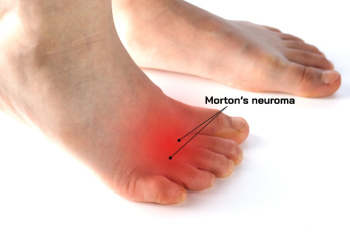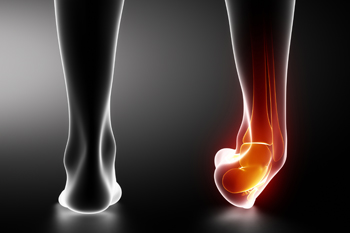
Pain on the inside of the ankle, also called medial ankle pain, is often linked to problems with the deltoid ligament, a strong band of tissue that supports the inner part of the joint. This ligament can be injured by rolling the ankle inward or from repeated strain over time. However, not all medial ankle pain comes from the deltoid ligament. Other causes include inflammation of nearby tendons, arthritis, or stress fractures. Symptoms may include swelling, stiffness, or difficulty bearing weight. A careful exam and imaging tests help identify the exact cause. Early treatment with rest, bracing, and targeted exercises can prevent further damage. Ignoring pain may lead to long-term issues with balance and mobility. If you feel pain or weakness on the inside of your ankle, it is suggested that you see a podiatrist for a diagnosis and appropriate treatment.
Ankle pain can have many different causes and the pain may potentially be serious. If you have ankle pain, consult with one of our podiatrists from Coastal Foot & Ankle Wellness Center, LLC. Our doctors will assess your condition and provide you with quality foot and ankle treatment.
Ankle pain is any condition that causes pain in the ankle. Due to the fact that the ankle consists of tendons, muscles, bones, and ligaments, ankle pain can come from a number of different conditions.
Causes
The most common causes of ankle pain include:
- Types of arthritis (rheumatoid, osteoarthritis, and gout)
- Ankle sprains
- Broken ankles
- Achilles tendinitis
- Achilles tendon rupture
- Stress fractures
- Tarsal tunnel syndrome
- Plantar fasciitis
Symptoms
Symptoms of ankle injury vary based upon the condition. Pain may include general pain and discomfort, swelling, aching, redness, bruising, burning or stabbing sensations, and/or loss of sensation.
Diagnosis
Due to the wide variety of potential causes of ankle pain, podiatrists will utilize a number of different methods to properly diagnose ankle pain. This can include asking for personal and family medical histories and of any recent injuries. Further diagnosis may include sensation tests, a physical examination, and potentially x-rays or other imaging tests.
Treatment
Just as the range of causes varies widely, so do treatments. Some more common treatments are rest, ice packs, keeping pressure off the foot, orthotics and braces, medication for inflammation and pain, and surgery.
If you have any questions, please feel free to contact one of our offices located in St. Augustine, and Palatka, FL . We offer the newest diagnostic and treatment technologies for all your foot care needs.

Morton’s neuroma is a thickening of nerve tissue between the toes, often causing burning, tingling, or a sensation of walking on a pebble. It usually develops from repetitive stress, wearing tight shoes, or abnormal foot mechanics. Treatment focuses on relieving pressure on the affected nerve. Padding, shoe modifications, and custom orthotics are often the first steps, helping to improve foot alignment and reduce irritation. Anti-inflammatory medications or corticosteroid injections may ease pain and swelling. In more persistent cases, alcohol sclerosing injections can shrink the neuroma over time. If conservative treatments do not provide relief, surgical removal of the neuroma may be considered. Early care typically leads to better outcomes and prevents worsening symptoms. If you are experiencing discomfort between your toes or unusual sensations while walking, it is suggested that you see a podiatrist for a diagnosis and appropriate treatment.
Morton’s neuroma is a very uncomfortable condition to live with. If you think you have Morton’s neuroma, contact one of our podiatrists of Coastal Foot & Ankle Wellness Center, LLC. Our doctors will attend to all of your foot care needs and answer any of your related questions.
Morton’s Neuroma
Morton's neuroma is a painful foot condition that commonly affects the areas between the second and third or third and fourth toe, although other areas of the foot are also susceptible. Morton’s neuroma is caused by an inflamed nerve in the foot that is being squeezed and aggravated by surrounding bones.
What Increases the Chances of Having Morton’s Neuroma?
- Ill-fitting high heels or shoes that add pressure to the toe or foot
- Jogging, running or any sport that involves constant impact to the foot
- Flat feet, bunions, and any other foot deformities
Morton’s neuroma is a very treatable condition. Orthotics and shoe inserts can often be used to alleviate the pain on the forefront of the feet. In more severe cases, corticosteroids can also be prescribed. In order to figure out the best treatment for your neuroma, it’s recommended to seek the care of a podiatrist who can diagnose your condition and provide different treatment options.
If you have any questions, please feel free to contact one of our offices located in St. Augustine, and Palatka, FL . We offer the newest diagnostic and treatment technologies for all your foot care needs.

Foot fractures can sometimes be mistaken for ankle sprains because both injuries cause pain, swelling, and difficulty walking. A fracture happens when a bone in the foot breaks, either from a sudden injury or repeated stress over time. An ankle sprain, on the other hand, involves stretched or torn ligaments. Since the symptoms can look very similar, it is easy to miss a fracture without proper evaluation. A podiatrist will ask how the injury happened and examine the foot for tenderness, bruising, and movement issues. Imaging tests like X-rays are usually needed to confirm whether a bone is broken. Missing a fracture can lead to delayed healing, ongoing pain, or long-term foot problems. If you have an injury that is not improving as expected, or the pain seems worse than a typical sprain, it is suggested that you see a podiatrist for an accurate diagnosis and appropriate treatment.
Broken ankles need immediate treatment. If you are seeking treatment, contact one of our podiatrists from Coastal Foot & Ankle Wellness Center, LLC. Our doctors can provide the care you need to keep you pain-free and on your feet.
Broken Ankles
A broken ankle is experienced when a person fractures their tibia or fibula in the lower leg and ankle area. Both of these bones are attached at the bottom of the leg and combine to form what we know to be our ankle.
When a physician is referring to a break of the ankle, he or she is usually referring to a break in the area where the tibia and fibula are joined to create our ankle joint. Ankles are more prone to fractures because the ankle is an area that suffers a lot of pressure and stress. There are some obvious signs when a person experiences a fractured ankle, and the following symptoms may be present.
Symptoms of a Fractured Ankle
- Excessive pain when the area is touched or when any pressure is placed on the ankle
- Swelling around the area
- Bruising of the area
- Area appears to be deformed
If you suspect an ankle fracture, it is recommended to seek treatment as soon as possible. The sooner you have your podiatrist diagnose the fracture, the quicker you’ll be on the way towards recovery.
If you have any questions, please feel free to contact one of our offices located in St. Augustine, and Palatka, FL . We offer the newest diagnostic and treatment technologies for all your foot care needs.








